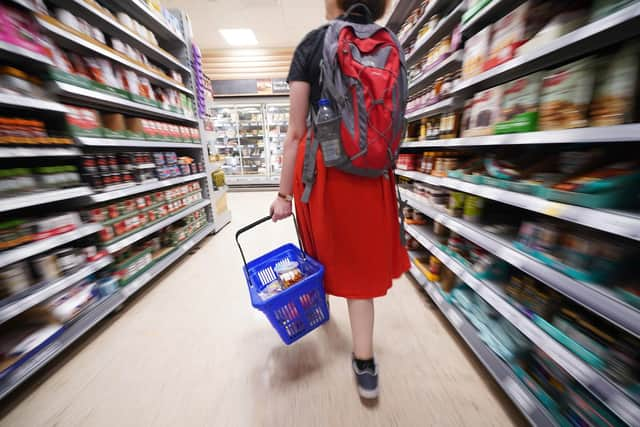Cost-of-living crisis: Supermarket value range shoppers bearing brunt of food price inflation
The price of value items was up 21.6 per cent last month on a year before, well in excess of overall grocery inflation of 15.9 per cent, Which? found.
In comparison, branded goods rose by 13.2 per cent over the year, own-label premium ranges were up 13.4 per cent and standard own-brand items increased 18.9 per cent.
Advertisement
Hide AdAdvertisement
Hide AdWhich? analysed inflation on more than 25,000 food and drink products at eight major supermarkets – Aldi, Asda, Lidl, Morrisons, Ocado, Sainsbury's, Tesco and Waitrose.


Its findings suggest those who are likely to be already struggling to feed their families and pay their bills during the cost-of-living crisis are being hit disproportionately with the sharpest food price increases.
Some of the biggest price increases on supermarket value items include Sainsbury's muesli rising 87.5 per cent from £1.20 to £2.25, tins of sliced carrots up 63 per cent from 20p to 33p at Tesco, and pork sausages up 58.2 per cent from 80p to £1.27 at Asda.
The butter and spreads category continued to show significant inflation, up 29.9 per cent, as did milk, which went up by 26.1 per cent on average across all eight supermarkets.
The price of cheese went up by 23.8 per cent overall, but some individual examples surged by as much as 96.6 per cent.
Prices were up 23.6 per cent at Lidl and 22.5 per cent at Aldi on a year ago, compared with 10.4 per cent at Ocado, 13.2 per cent at Sainsbury's, 13.6 per cent at Tesco, 14.4 per cent at Morrisons, 15.2 per cent at Waitrose and 16.8 per cent at Asda.
However Which? found the discounters were generally still cheaper than their competitors.
Sue Davies, Which? head of food policy, said: "It's clear that food costs have soared in recent months, but our inflation tracker shows how households relying on supermarket value ranges are being hit the hardest.
Advertisement
Hide AdAdvertisement
Hide Ad"Supermarkets need to act and Which? is calling for them to ensure everyone has easy access to basic, affordable food ranges at a store near them, particularly in areas where people are most in need.
"Supermarkets must also do more to ensure transparent pricing enables people to easily work out which products offer the best value and target their promotions to support people who are really struggling."
It comes as UK environment secretary Therese Coffey said shortages of fruit and vegetables would be a temporary issue that should be resolved in two to four weeks.
A shortage of tomatoes in UK supermarkets has widened to other fruit and vegetables due to a combination of bad weather and transport problems in Africa and Europe.
Some supermarkets have introduced customer limits on certain fresh produce, with photographs emerging of empty shelves.
Ms Coffey told the Commons a “lot of people would be eating turnips right now” under a seasonal food model – rather than thinking about lettuce, tomatoes and similar produce – although she accepted consumers want a “year-round choice”.
Comments
Want to join the conversation? Please or to comment on this article.